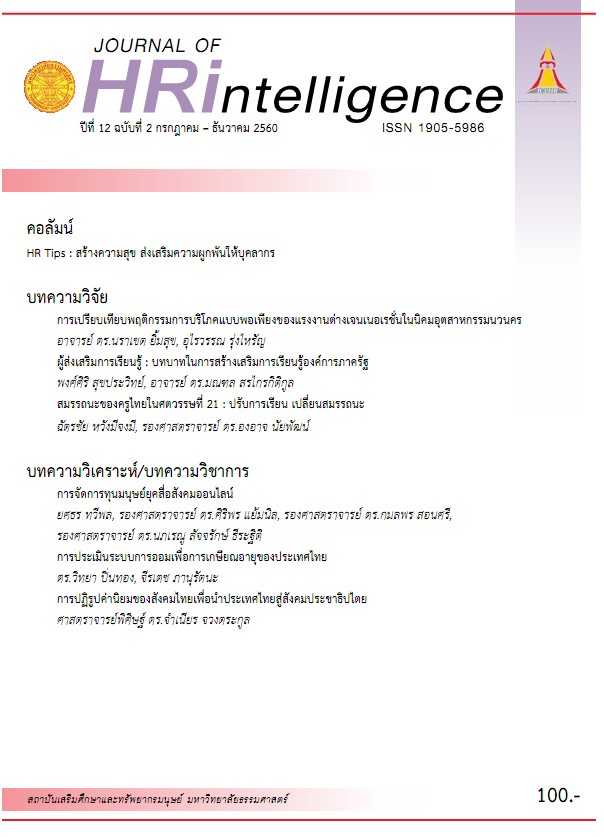THAI CULTURAL VALUES REFORM FOR A DEMOCRATIC SOCIETY
Main Article Content
Abstract
The objective of this paper is to present a process for reforming Thai cultural values to align with democratic values. In order to propose a reform process, various literature reviews were made and “VAVRIEM Model” was developed and presented as a new reform process. The proposed reform process comprises of seven steps: (1) creating a clear vision and objective of Thai society; (2) creating awareness of vision and objective of Thai society among Thai people; (3) identifying and creating the desired core Thai cultural values that align with democratic society; (4) creating readiness for change and acceptance of the identified and created core Thai cultural values that support democratic society among Thai people; (5) implementing the identified and created core Thai cultural values that support democratic society in Thai society; (6) making follow-up and evaluation of the implementation of the identified and created core Thai cultural values that support democratic society in Thai society; and, (7) taking all necessary corrective actions. It is recommended that the proposed reform processes be implemented in order to achieve the goals outlined in this paper.
Article Details
ขอมอบลิขสิทธิ์บทความที่ได้รับการตีพิมพ์ให้แก่สถาบันเสริมศึกษาและทรัพยากรมนุษย์ กรณีมีการฟ้องร้องเรื่องการละเมิดลิขสิทธิ์เกี่ยวกับภาพ กราฟ ข้อความส่วนใดส่วนหนึ่ง และ/หรือข้อคิดเห็นที่ปรากฎในบทความ ให้เป็นความรับผิดชอบของข้าพเจ้าและผู้เขียนร่วมแต่เพียงผู้เดียว
References
ศูนย์กฎหมายธุรกิจอินเตอร์เนชั่นแนล จำกัด.
จำเนียร จวงตระกูล. (2553ข). การวิจัยเชิงคุณภาพ : เครื่องมือสร้างองค์ความรู้เพื่อการพัฒนาประเทศ. กรุงเทพมหานคร : บริษัท
ศูนย์กฎหมายธุรกิจอินเตอร์เนชั่นแนล จำกัด.
จำเนียร จวงตระกูล. (2553ค). การพัฒนาทรัพยากรมนุษย์ : ทฤษฎีและการปฏิบัติ. กรุงเทพมหานคร : บริษัท ศูนย์กฎหมาย
ธุรกิจอินเตอร์เนชั่นแนล จำกัด.
บัวสี่เหล่า. Online available at : https://phatpark.wordpress.com: retrieved 22 October 2017.
ราชบัณฑิตสถาน. (2546). พจนานุกรมฉบับราชบัณฑิตยสถาน พ.ศ. 2542. กรุงเทพมหานคร : บริษัท นานมีบุ๊คส์พับลิเคชั่นส์จำกัด.
สถาบันพระปกเกล้า. ค่านิยม 12 ประการตามนโยบายของคณะรักษาความสงบแห่งชาติ. Online available at: http://www.
wiki.kpi.ac.th: retrieved 21 October 2017.
สถาบันพระปกเกล้า. ประกาศของคณะราษฎร์. Online available at : https://wiki.kpi.ac.th: retrieved 22 October 2017.
Armstrong, M. (2010). Armstrong's Essential Human Resource Management Practice : A Guide to People Management.
London : Kogan Page.
Carlopio, J., & Andrewartha, G. (2008). Developing Management Skills : A Comprehensive Guide For Leaders
(4 ed.). Frenchs Forest NSW : Pearson Education Australia.
Carr, 2016. Democracy: Who invented democracy?. Online available at : http://www.quart.us : retrieved 21 October
2017.
Change management model-Lewin. Online available at: https:// www.pinterest.com : retrieved 22 October 2017.
Chivers, 2017. From Magna Carta to universal suffrage, the 1000-year history of British democracy. Online available
at : http://www.telegraph.co.uk : retrieved 21 October 2017.
Congruence Model. Online available at : https://leg4.wikispaces.com/Congruence+Model : retrieved 23 October
2017.
Core Democratic Values Defined. Online available at : https://www.learningtogive.org : retrieved 21 October 2017.
Core Democratic Values List. Online available at : https://1.cdn.edl.io: retrieved 21 October 2017.
Creswell, J. W. (2014). Research Design : Qualitative, Quantitative, and Mixed Methods Approaches (4 ed.). Los
Angeles : SAGE.
Creswell, J. W., & Plano Clark, V. L. (2007). Designing and Conducting Mixed Methods Research. Thousand Oaks :
Sage.
Democratic Values - Liberty, Equality, Justice. Online available at : http://www.ushistory.org/gov/ld.asp: retrieved
21 October 2017.
8 Steps to Change Management. Online available at : https:// www.pinterest.com: retrieved 22 October 2017.
Hiatt, J. M. (2006). ADKAR : A Model for Change in Business, Government and Our Community Loveland, Colorado :
Prosci Research.
Hofstede, G. (1984). Culture's Consequences : International Differences in Work-Related Values. London : Sage.
Joungtrakul, J. (2009). Industrial Democracy and Best Practice in Thailand. Saarbrucken, Germany : LAP Lambert
Academic Publishing AG & Co. KG.
Joungtrakul, J. (2016). Making Change Last : Is It an Impossible Task in Thailand. AFBE Journal, 9 (1), 34-52.
Joungtrakul, J., & Teparagul, O. (2012). Social dialogue in Thailand. In C. Perryer & D. Plowman (Eds.), Business
Development in Asia (pp.149-156). Broadway, Western Australia : Juniper Press Asia.
Komin, S. (1990). The Psychology of the Thai People : Values and Behevioral Patterns. Bangkok : National Institute
of Development Administration (NIDA), Research Center.
Kotter, J. (2016). The 8-Step Process for Leading Change. Retrieved 31 May 2916, from Kotter International.
Kotter, J. P. (2002). The Heart of Change : Real-life Stories of How People Change their Organizations. Boston,
Mass : Harvard Business School Press.
Kotter, J. P. (2007). Leading Change : Why Transformation Efforts Fail. January 2007 (Best of HBR), 1-11. Retrieved
from Harvard Business Review. website : www.hbrreprints.org
Kotter, J. P. (2012). Leading Change. Boston, Mass : Harvard Business Review Press.
Kreitner, R. (2007). Management (10 ed.). Boston, MA. : Houghton Mifflin Company.
Lewin, K. (2000 orig. 1951). The Field Approach : Culture and Group Life as Quasi-Stationary Processes. In W. L.
French, C. H. Bell & R. A. Zawacki (Eds.), Organization Development and Transformation : Managing Effective
Change (5th ed., pp.115). Boston : Irwin McGraw-Hill.
Magna Carta-British History. Online available at : http://www.history.com : retrieved 21 October 2017.
Mercer Delta Consulting LLC, (2003). The Congruence Model : A Roadmap for Understanding Organizational
Performance. Online available at : https://ldt.stanford.edu/-gwarman/Files/Congruence_Model.pdf : retrieved
23 October 2017.
Nadler, D. A., & Tushman, M. L. (1980). Frameworks for Organizational Behavior - A model for diagnoseing
organizational behvior : Applying a congruence perspective. AMA-COM, https:///pdf.hs.colu,bia.edu/
Congruence-Model.pdf : retrieved 23 October 2017.
Nadler, D. A., & Tushman, M. L. (1989). Organizational Frame Bending : Principles for Managing Reorientation. The
Academy of Management EXECUTIVE, 3 (3), 194-204.
Peters, T.J., & Waterman, R.H. (1982). In Search of Excellence : Lessons from America's Best-Run Companies.
New York : Harper & Row, Publishers.
Prosci ADKAR Model. Online available at : https://www.pinterest.com : retrieved 22 October 2017.
Rogers, E. M. (1983). Diffusion of Innovations (3 ed.). New York : The Free Press.
Runyon, K. E. (1977). Consumer Behaviour and the Practice of Marketing. Columbus, Ohio : Charles E. Merrill.
Swanson, R. A., & Holton III, E. F. (2001). Foundations of Human Resource Development. San Francisco : Berrett-Koehler.
Trompenaars, F., & Hampden-Turner, C. (1998). Riding the Waves of Culture : Understanding Cultural Diversity in
Global Business (2nd ed.). New York : McGraw-Hill.
What is the ADKAR Model?. Online available at : https://www.prosci.com/adkar/adkar-model : retrieved 22
October 2017.


